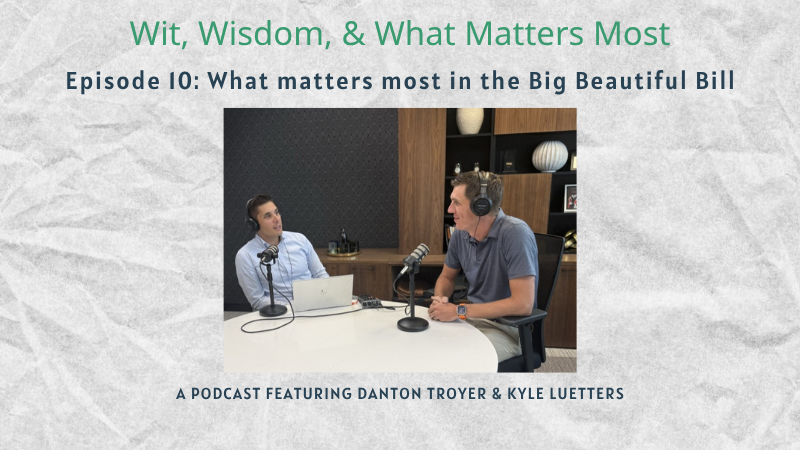Episode Transcript
Kyle:
Welcome to another edition of Wit, Wisdom, and What Matters Most. It’s a podcast with Moneta’s Gast Freeman Troyer Racen Team. My name is Kyle Luetters.
I’m joined by Danton Troyer. Danton, coming off of a holiday weekend where the fireworks weren’t the hottest thing maybe that was going on throughout the weekend. The One Big Beautiful Bill signed into law on Independence Day itself.
For a juxtaposition of numbers, America celebrating 249 years of independence with a bill that’s 1,116 pages long.
Danton:
It’ll be interesting. We get a lot of questions over what’s going to be in the bill and a lot of news. And so now we know. Sort of.
Kyle:
It’s sort of. To that point, that’s why we emphasize the 1,116 pages to it. What we really wanted to do here with this edition of the podcast, though, was really look at this bill, you know, obviously the political situation in Washington is very distinct, but really taking a look at this solely through the eyes of two CERTIFIED FINANCIAL PLANNERS.® What are some of the opportunities? What are some of the key provisions of this tax bill that will affect a lot of different people?
Because there are individual tax provisions. There’s changes to the estate tax as well as certain things for business owners to be aware of and to keep their eyes on as well, too. So we’re not going to cover it all. There’s no possible way. And obviously to check in with CPAs and other tax professionals as well, too, before making any final moves. But we wanted to go through some of the things that as we read through this bill and summaries of this bill, some of the things that just kind of jumped out to us as unique kind of planning opportunities.
Danton:
Yeah, and also discuss what were some of the things that made it into the bill and what were some of the things that got cut last minute and how that might have affected some of the folks that maybe didn’t get everything they wanted to or at least the devil being in the details.
Kyle:
A hundred percent. And Danton, one of the things that I thought was the most unique about this bill versus the Tax Cuts and Jobs Act of 2017 was there,and it has to do with when the bill is passed. I remember Tax Cuts and Jobs Act was passed right at the end of the year. A lot of CPAs and tax professionals were literally pulling their hair out as the final bill gets passed in December and goes into effect January 1st. This bill passed more at the midpoint of the year. So there’s some provisions that affect 2025 and we’ll get into those. And then there’s also some that don’t start until 2026.
But I think one of the biggest things for us to talk about here real quick is the impetus for this bill. Or one of the big ones was that the TCJA, the Tax Cuts and Jobs Act, like we referred to, was scheduled to sunset at the end of 2025, so that’s really what kind of kick started a lot this legislative process.
Danton:
Yeah, so what do you see as the things that are going to be continuing and what’s getting cut from there?
Kyle:
There was a lot in this bill that really codified the changes that were temporary and made them permanent. One of the biggest things is keeping the rate and brackets that we currently have in making them permanent and adjusting them for inflation every year. So, it is definitely more solid footing, if you will, on tax strategy as we’re having conversations about things like Roth conversions, charitable giving, knowing where people are going to end up in the tax brackets.
We were honestly having quite a few conversations and modeling sessions with folks had the election gone the other way at the end of 2024. Fortunately or unfortunately, we wadded up a lot of those and threw them in the waste paper basket. But now we know at least for a while, because we never know what politically will happen, but we at least know for the foreseeable future what brackets we are dealing with.
And a couple of other things that made this permanent, the standard deduction, that was a big leap back in 2017. And it increased a little bit for 2025. It will be indexed for inflation, but we’ve made that increased standard deduction permanent.
Personal exemptions, which used to be a big thing in the tax code, are still removed. And another thing that was kind of codified in this was an Expanded Child Tax Credit. Now the House bill originally was $2,500 per kid. The Senate’s decided on $2,200, starting next year is kind of the final lay of the land. But you got to remember, the Tax Cuts and Jobs Act basically doubled that. And we saw a much higher one during the pandemic as well, too. And that was also, too, when we got into the situation where they kind of doled out that child tax credit early via direct deposit under the Biden administration.
So those are a couple of things there. And we’re going to kind of hop around here a little bit, but some other provisions that are permanent through this, and I think this is a huge one, especially with some of the families that we end up working with quite a bit, is the permanent increase of the estate and lifetime gift tax exemption to an inflation indexed amount of $15 million for single filers and $30 million for joint filers beginning in 2026. So in 2025, it’s about $13.99 million, so a healthy jump into 2026, and then increased for inflation after that, which is a very big planning opportunity.
Danton:
Yeah, it seems like, at least as it relates to the 2017 tax cuts, we kept a lot of the major pieces in place. I mean, there’s some nuance there, but it’s just nice to have kind of at least some clarity on how long this is going to go for and be able to do a little bit more than a year at a time planning, it feels like a lot of these times.
Kyle:
I don’t know if you felt this way, but as a planner, I kind of thought that we were kind of playing with one hand tied behind our back with a sunset. And it was always kind of this weird thing when you were sitting down with someone and saying, hey, now that we know what this is, this is probably 2018, we know that it’s going to sunset at the end of 2025 unless Congress acts, but you may not be ready to do something. And so it was kind of a non-conversation. And now that changes a little bit to say, hey, unless there is another major bill, major piece of sweeping legislation, these are the rules. And so we have a much longer runway.
A couple of other things here on the business side of things, 100% bonus depreciation for short-lived investments, very key for business owners.
And then permanently reinstating the EBITDA-based limitation on business net interest deductions is a huge one that comes into play here.
There’s some international tax provisions. I don’t want everyone to go to sleep that’s listening to this. We won’t dive into those.
Danton:
Talk about the taxes and how that will be addressed as it relates to Social Security, because I think that’s a lot of people’s maybe concern and on their mind is, is it going away? But the taxes, it doesn’t really affect that so much, but it may affect their bottom line and how much they’re receiving.
Kyle:
Very good question because on the campaign trail, we heard a campaign pledge of no taxes on Social Security. We also heard no taxes on tips and overtime, which by the way, did make it into the final bill, there are some pretty low caps on that.
But as far as Social Security goes, that was not addressed specifically in the bill. However, I think the compromise though was added with a temporary senior deduction of $6,000 for each qualifying individual for both itemizers and non-itemizers that phases out when modified adjusted gross income exceeds $75,000. Now that’s temporary; it’s available from 2025 through 2028. And I think as we always talk about in Washington, D.C., you never want to see how the sausage is made. That was one of the compromises to providing some relief in that arena without necessarily completely saying Social Security is not taxed.
A number of the states have it on their ballots to take a look at that. I know Missouri is looking at it; that’s where we are. But I thought that was kind of like a unique compromise, if you will.
Another thing that I thought was very contentious, and I’ll have you chime in on here, was the SALT tax deduction cap. In the old bill, it was $10,000. And the Senate initially said, we’re not raising it from $10,000. The House bill passed at $40,000. There was a lot of handling behind closed doors, but eventually they did increase it to $40,000, and that cap will go up by 1 percent through 2029. And it is subject to a phase-out with taxpayers with incomes above $500,000.
Danton:
Yeah, it seems like this is another political football back and forth where the Democrats want to benefit their potentially higher-income state taxes. So, it’s nice to see that there is a deduction that is increased. So anytime from our perspective, we’re legally able to pay less in taxes, it’s probably a good thing. So, it’s nice to see. It would be nice to have maybe a little bit longer timeframe as far as clarity goes, but it’s better than nothing.
Kyle:
Well, and another thing to point out, too, is that above that $500,000 income, there’s a cap to the flat $10,000 thereafter. So, I mean, it’s not like a use it or a lose it type of a deal, so, but there is some kind of parameters around it.
Another thing that I thought was very interesting was charitable giving was addressed in this bill in two ways. One, it creates a half a percent floor on itemized deductions for charitable contributions. So you need to be aware of that as you’re giving things away.
But then also, too, and this is a unique planning opportunity for the vast majority of people that take the standard deduction, is there is now a permanent $1,000 above the line deduction for charitable contributions if you’re a single filer and $2,000 for joint filers. You know, for a long time, we’ve heard folks coming in saying, hey, you know, the standard deduction just makes the most sense for me, so why should I give? Well, now there’s an increased incentive because with this above-the-line deduction, even if not itemizing you can still see some benefit for your charitable giving.
Danton:
Yeah, I think that, from our perspective, it may take away some of the planning opportunities we do with Donor Advised Funds for those larger gifts. But overall, that’s great to be able to get, quote-unquote “credit” for donating to these charities, especially churches and the kind of one-off donations that people don’t always account for even. So it is nice that they’ll be able to at least get some sort of credit from a tax perspective on those smaller donations.
Kyle:
Well, and I think, not diving too much into the tax weeds here as a nerd, but very similar in the way that you kind of stack the American Opportunity Tax Credit with college expenses, i.e., you have to pay the first $2,000 out of pocket and then spend out of the 529 account. I wonder, and this is something to suss out over the long term is if you don’t take that first $2,000 paid out of pocket, and then your Donor Advised Fund comes in after that to continue doing your giving, because that above-the-line deduction for charitable contributions is for both itemizers and non-itemizers.
Danton:
Yeah, that’ll be another devil in the details of how these things actually get implemented. So, like I said, we have clarity, but it’s not…there’s always additional follow-up questions, it seems like.
Kyle:
Another one that kind of came up here that was for some a bit of a head-scratcher on kind of the individual side, it’s a temporary deal, but making auto loan interest deductible for itemizers and non-itemizers for new autos with final assembly in the United States for tax years from 2025 through 2028. You can deduct up to $10,000 and it phases out at a 20% rate when income exceeds $100,000 for single filers or $200,000 for joint filers. You know, for retirees, somebody that maybe has done a great job planning, they’re not ready to turn on Social Security or take things out of their IRA yet, they might have a year or two where they’re living on kind of savings, if you will, and this might be an effective play if they want to finance a vehicle during that period of time. But again, it’s just temporary, it’s a smaller window, it’s 2025 through 2028, so we’re really, we get two and a half years where this is really kind of taking into a play, but it’s just one of these carved out nuances that I thought was interesting.
Danton:
Yeah, I think that sums it up. I mean, it’s interesting, but the effect from a planning perspective is probably not that much. But, you know, you see that with a lot of these things where they put them in there because they get headlines and then they kind of take it back a little bit with the, even with the no taxes on Social Security is promised, no tax on tips is promised, but then you get the details and they weren’t necessarily not telling the truth, but again, there’s a little detail to it.
Kyle:
Yeah, speaking of that tip income, up to $25,000 of tip income is deductible for individuals in traditionally and customarily tipped industries, define that?, per tax years 2025 through 2028. The deduction phases out at a 10% rate when adjusted gross income exceeds $150,000 for single filers or $300,000 for joint filers. You know, so again, as Danton has always said in this podcast, the devil is in the details and broad brush, it sounds great, but now when we really kind of get into it now, it’s a lot more substantiation on the taxpayers’ side of things.
And to me, the thing that would be most worrisome is traditionally and customarily tipped industries.Danton, I don’t know about you, but it feels like after COVID, like everywhere I go and I place my card in the machine, it asks me if I want to leave a tip. So do they all qualify now? So that’s just something interesting.
Speaking of, to drive back a second to automobiles for a second, another thing that came out in this bill was the repeal of a lot of the Inflation Reduction Act green energy initiatives, namely with the automotives, the $7,500 – up to $7,500 I should say – EV tax credit and how that’s going to affect some folks that made use of that to get an EV here in the past number of years.
Danton:
I think another thing, not as big of an audience, but just those green for your home improvements, those credits are going away at the end of the year. So, you know, if you’re kind of holding off and maybe thinking you had a little more time, you don’t. You probably need to get that on the calendar this year to get those credits on your taxes or those are going away at the end of the year.
Kyle:
So, Danton, referring to the Energy Efficient Home Improvement tax credits, if you’ve got an HVAC system that, and I don’t know why this, but my wife always is convinced that our HVAC system is like two teardrops away from dying. And I think some people are like that. You know, if you are going to replace and do need to replace this year might be advantageous because those tax credits now will, set to, expire at the end of the year. Same thing too for exterior doors and windows. There are tax credits available if you replace those, keep your receipts. I’m not going to go ahead and put the caps here in the podcast, but we will link to some articles that will.1 But, you know, that’s another great way that if there was some things you were going to do this year from a home improvement standpoint, get them done and save a little tax as we go. Because remember that a credit is a dollar-for-dollar reduction in tax liabilities.
And Danton, as we’ve mentioned, there’s no possible way to cover every single provision in this 1,116-page bill. I’m going to continue to lament that just to show you, or convey how, large of a piece of legislation this was. It did live up to its name. I haven’t seen it in physical representation, but I can say that it is a big bill.
But Danton, you and I now have been doing this long enough that administrations change, legislative agendas change. What we do as planners is try to have as long a term outlook as we can and look for opportunities as the rules are updated. I’m not necessarily going to say change, but as rules are updated, because now this seems to be, I’m not going to say a frequent thing, but, we’ve seen a lot of major shifts in tax policy here in the last couple of decades. And so that’s really what we’re after.
Danton:
Yeah, it certainly feels like every four years we get a whole new set of rules. And maybe with this bill, it probably wasn’t as much as the hype kind of leading up to it. It doesn’t seem like there was really that much change. If more of anything, it was just keeping it consistent, which overall I think is good. But if we were looking for a simplified tax code or a change in the way we do things, that certainly wasn’t this. I mean, it’s more of just continuing on the path we were on.
Kyle:
I think you’re spot on there. And I think that this is not going to be, there’s no provision in here that is just absolutely earth-shattering or completely changes the trajectory of someone’s life or their retirement or really their ability to save.
I guess the one thing we really didn’t hit on was Trump account for babies. But there’s enough things that I think Treasury needs to sort out there that I don’t feel confident speaking on those quite yet. But yeah, you nailed it right there. It’s like, it seems like this does change. But I think the key thing is having someone in your corner that’s taking a look at these types of things, distilling them out, and then applying what the new rules, guidelines, regulations are to unique planning opportunities for everyone’s individual picture, because they’re all different. The way that these are applied to achieve goals and objectives is very different. Sometimes they’ll help, and sometimes it’s maybe not worth messing with.
Danton:
Yeah, I think that’s exactly it. Just, a thousand pages, then what does that mean for me?, is what we try to get to. And I mean, that’s obviously what people want out of this. And then also, most people aren’t going to want to read a thousand-page bill when 99% of it doesn’t even apply to them.
Kyle:
Or are you trying to say that my idea of a date night didn’t work? I kid, I kid. But no joke, it was an interesting weekend to see everything that came out of it.
And as always, if you have questions, or if there’s anything further that you want to hear about, please be sure to follow our social channels. We continue to put out content to help distill some of the things that are going on. But, you know, Danton, we’ll continue to chug along and keep doing the things that we’re doing.
Well, What Matters Most is a production of Moneta’s Gast Freeman Troyer Racen team, headquartered in St. Louis, Missouri. Until next time, enjoy what matters most.
- IRS. “Home energy tax credits,” IRS.gov – https://www.irs.gov/credits-deductions/home-energy-tax-credits
Watson, Garrett; Li, Huaqun; York, Erica; Muresianu, Alex; Cole, Alan; Van Ness, Peter; Durante, Alex. “’One Big Beautiful Bill Act’ Tax Policies: Details and Analysis” Tax Foundation. July 4, 2025 https://taxfoundation.org/research/all/federal/big-beautiful-bill-senate-gop-tax-plan/
© 2025 Advisory services offered by Moneta Group Investment Advisors, LLC, 100 South Brentwood Blvd., St. Louis, MO 63105 (“MGIA”), an investment adviser registered with the Securities and Exchange Commission (“SEC”). MGIA is a wholly owned subsidiary of Moneta Group, LLC. Registration as an investment adviser does not imply a certain level of skill or training. This is an advertisement. The information contained herein is for informational purposes only, is not intended to be comprehensive or exclusive, and is based on materials deemed reliable, but the accuracy of which has not been verified. Examples contained herein are for illustrative purposes only based on generic assumptions. Given the dynamic nature of the subject matter and the environment in which this communication was written, the information contained herein is subject to change. This is not an offer to sell or buy securities, nor does it represent any specific recommendation. You should consult with an appropriately credentialed professional before making any financial, investment, tax, or legal decision. Past performance is not indicative of future returns. You cannot invest directly in an index. All investments are subject to a risk of loss. Diversification and strategic asset allocation do not assure profit or protect against loss in declining markets. These materials do not take into consideration your personal circumstances, financial or otherwise. Trademarks and copyrights of materials linked herein are the property of their respective owners.




© 2025 Advisory services offered by Moneta Group Investment Advisors, LLC, 100 South Brentwood Blvd., St. Louis, MO 63105 (“MGIA”), an investment adviser registered with the Securities and Exchange Commission (“SEC”). MGIA is a wholly owned subsidiary of Moneta Group, LLC. Registration as an investment adviser does not imply a certain level of skill or training. This is an advertisement. The information contained herein is for informational purposes only, is not intended to be comprehensive or exclusive, and is based on materials deemed reliable, but the accuracy of which has not been verified. Examples contained herein are for illustrative purposes only based on generic assumptions. Given the dynamic nature of the subject matter and the environment in which this communication was written, the information contained herein is subject to change. This is not an offer to sell or buy securities, nor does it represent any specific recommendation. You should consult with an appropriately credentialed professional before making any financial, investment, tax, or legal decision. Past performance is not indicative of future returns. You cannot invest directly in an index. All investments are subject to a risk of loss. Diversification and strategic asset allocation do not assure profit or protect against loss in declining markets. These materials do not take into consideration your personal circumstances, financial or otherwise. Trademarks and copyrights of materials linked herein are the property of their respective owners.



